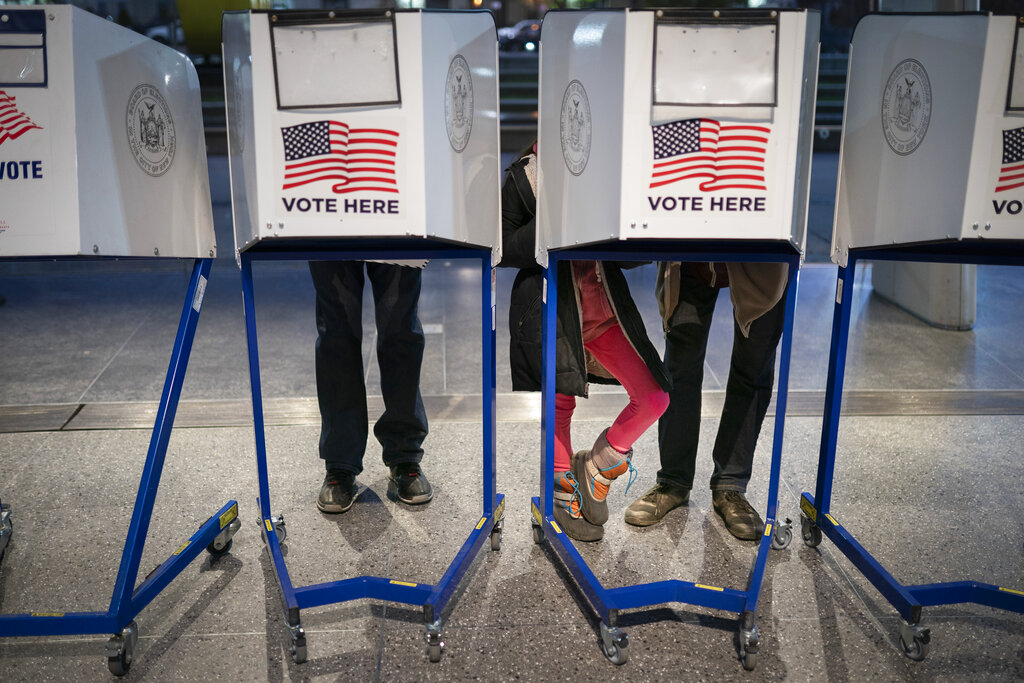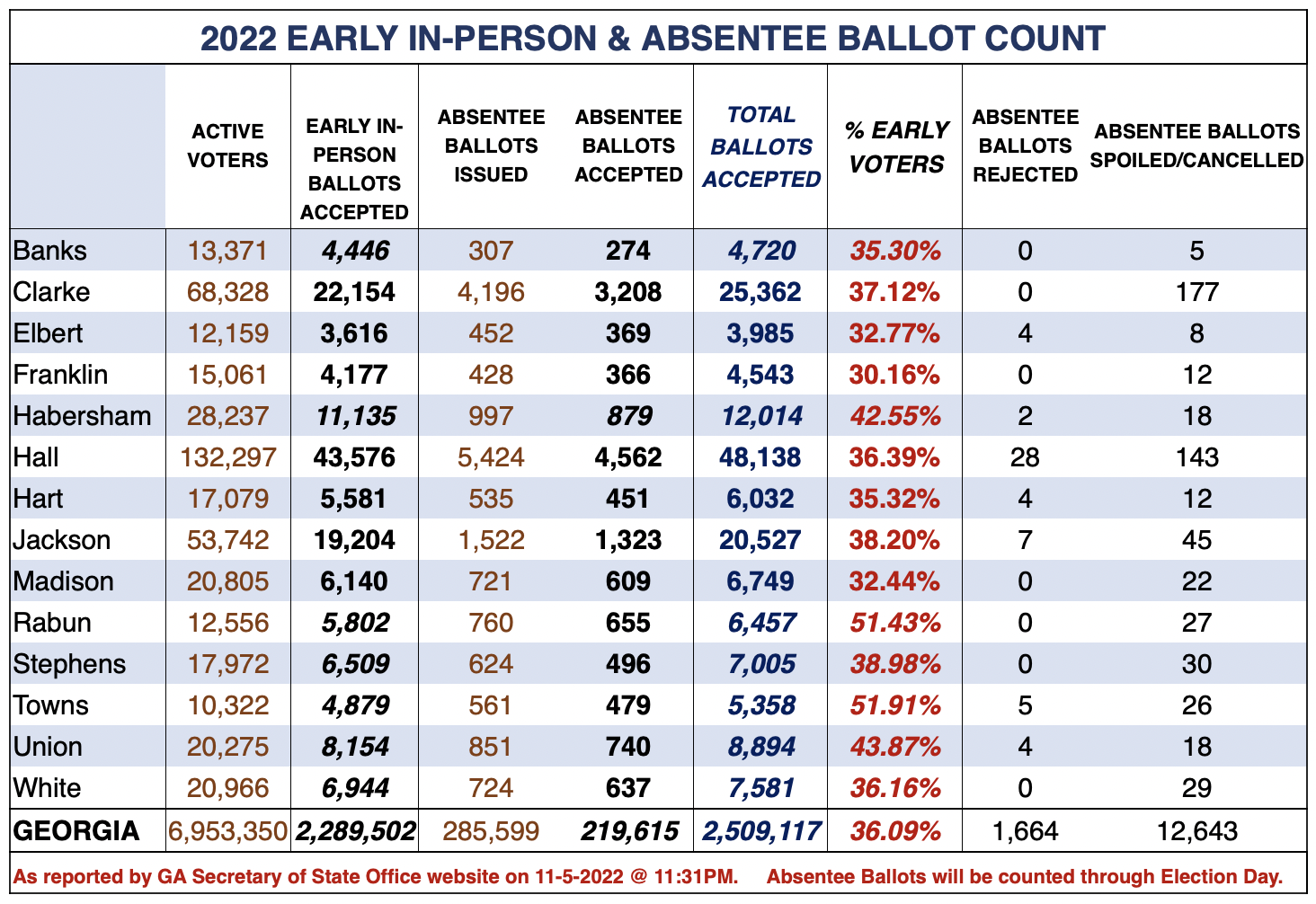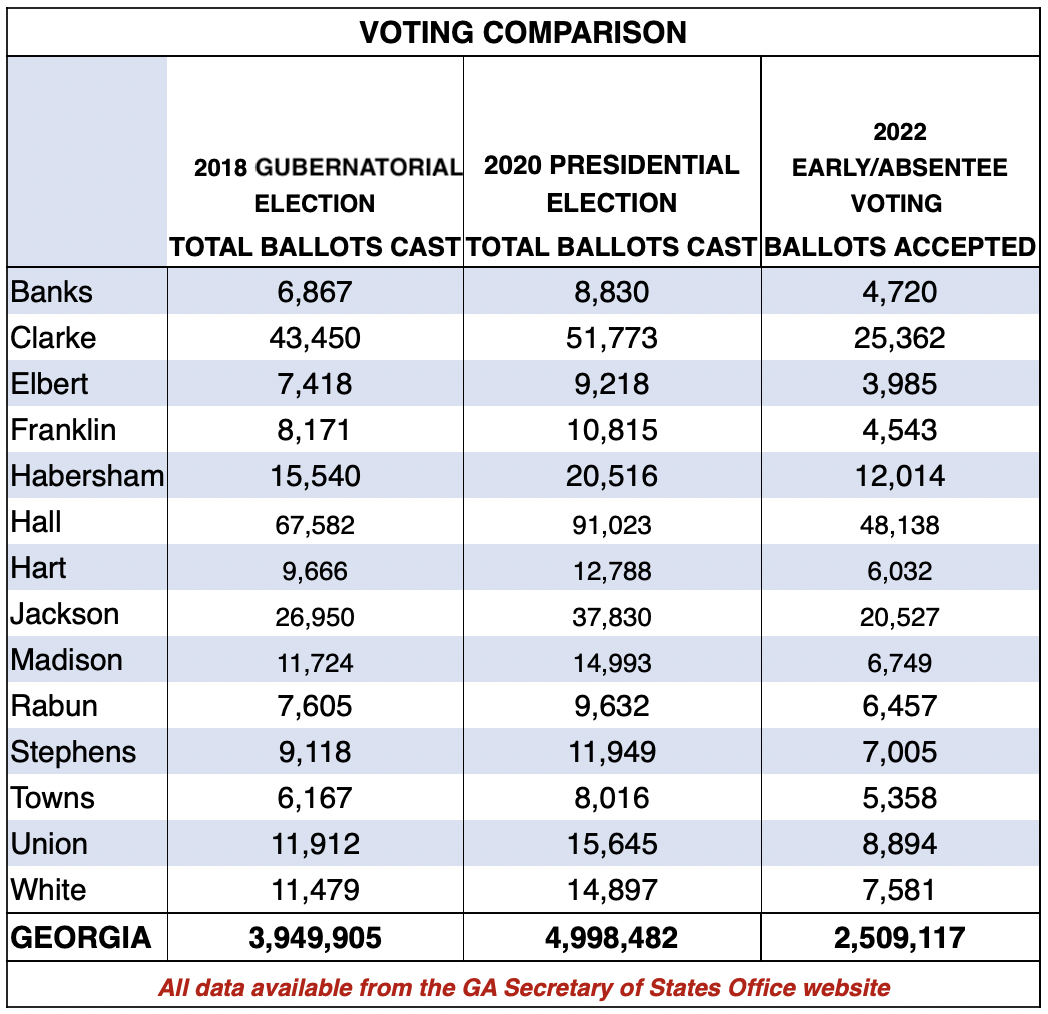WASHINGTON (AP) — Follow along for real-time, on-the-ground updates on the 2022 U.S. midterm elections from The Associated Press.
READ MORE
Election Day, Election Night, Election Morning After: Control of Congress still hangs in the balance as Democrats showed unexpected resilience in the midterm elections. With votes still being counted across the country, Republicans still had the opportunity to win control, but the results were nonetheless uplifting for Democrats who were braced for sweeping losses, AP national political reporters Sara Burnett, Jill Colvin and Will Weissert report.
___
SNAPSHOT
Wisconsin Gov. Tony Evers won a second term in office, positioning himself as a check on Republican power in the state. Evers often touted the fact that he vetoed more than 120 GOP-backed bills that would have broadened gun rights, limited access to abortion and made it harder to cast absentee ballots.
___
2:15 a.m.
Republican Leader Kevin McCarthy addressed supporters for the first time early Wednesday morning, staking his party’s claim of the House majority despite several dozens of seats still undecided.
“Now let me tell you, you’re out late, but when you wake up tomorrow, we will be in the majority and Nancy Pelosi will be in the minority,” the California lawmaker, who could be poised to become Speaker should Republicans take the House, said at a election event in Washington.
The speech, which had originally been planned for hours earlier, noted several GOP gains across the country, especially in highly contested races in Virginia and Texas. McCarthy’s comments came as key Democratic wins in the House began to cast doubts on the possibility of a red wave this midterm election.
___
THEY SAID IT
“This campaign has always been about fighting for everyone who’s ever been knocked down that ever got back up.”
— John Fetterman, Pennsylvania’s newest senator-elect
The AP called the race for Fetterman, a Democrat who was in a tight contest with television personality Mehmet Oz, early Wednesday morning. In a victory speech before the race call, Fetterman nodded to his stroke earlier this year: “Health care is a fundamental right and it saved my life.”
Fetterman’s victory flips the Senate seat for Democrats as he replaces retiring Republican Pat Toomey.
___
READ MORE
“It’s why you brew coffee,” John King grumbled after yet another spin through rural Georgia counties on CNN’s “magic wall” trying to decipher that Senate race.
It was an election night that even TV news couldn’t impose a storyline upon, AP media writer David Bauder reports. Tight races across the country confirmed the nation’s divide and kept reporters across formats wary of drawing conclusions about the political future.
___
SNAPSHOT
Democratic Michigan Gov. Gretchen Whitmer has won a second four-year term, defeating Republican challenger Tudor Dixon in a campaign that focused on their opposing views on abortion.
___
READ MORE
While Mayor Muriel Bowser easily coasted to a third term, one of the more interesting items on the Washington, D.C., ballot this year was a proposal to completely revamp the way servers and bartenders in Washington’s many restaurants are paid, AP’s Ashraf Khalil reports.
Initiative 82, which passed easily with almost 75% of the vote, will eliminate the so-called tipped wages system in which restaurant owners pay certain staff members well below the $16.10 minimum hourly wage.
The referendum is particularly notable since literally the same idea was approved by voters four years ago, only to be immediately overturned by the D.C. Council and Bowser amid murky circumstances.
Currently, restaurant managers pay some staffers salaries as low as $5.35 per hour. If the employees’ tips for the night don’t raise that income up to the minimum, the employers make up the difference. That two-tiered system will now be phased out and employers will be required to pay every staffer at least the $16.10 minimum by 2027.
The dynamic was more complex than merely labor vs. management and the debate divided the staffs of restaurants and bars. Many waiters and bartenders opposed it since they currently earn well above the minimum on tips and feared those tips would shrink if an owners imposed an extra service charge in response to their increased costs.
The D.C. Council members seem unlikely to overturn the measure again. They drew accusations of backroom influence from the restaurant industry the first time around. And the idea has apparently become much more popular in the past four years, gaining 20 percentage points over its 2018 margin of victory.
___
THEY SAID IT
“I have felt a weight on my shoulders to make sure that every little girl and all the women of the state who’ve had to bang up against glass ceilings everywhere they turn, to know that a woman could be elected in her own right and successfully govern a state as rough and tumble as New York.”
— Gov. Kathy Hochul, New York’s first elected female governor, standing under a literal glass ceiling
___
THEY SAID IT
“Even though our fight for the governor’s mansion may have come up short, I’m pretty tall.”
— Stacey Abrams, conceding the Georgia governor’s race to incumbent Brian Kemp
After the Democrat lost her gubernatorial campaign in 2018, she refashioned herself as an advocate for voting rights and garnered the admiration of Democrats nationwide.
But it wasn’t enough to help her win a rematch with Kemp, a Republican, which the AP called early Wednesday. Abrams had delivered her concession speech before the call.
It was a difficult blow to Abrams, who had been viewed as a potential force within the party at a time when Georgia has been increasingly contested as a battleground state.
And it showed Kemp’s ability to salvage a political career that was in danger after he angered former President Donald Trump by refusing to go along with his false claims that the 2020 election was stolen.
___
STATUS UPDATE
Democrat Josh Shapiro has been elected as governor of Pennsylvania, defeating hard-right Republican candidate Doug Mastriano after a highly anticipated battle in a key battleground state.
Shapiro, a two-term state attorney general, will replace the term-limited Democrat Tom Wolf.
Mastriano, a member of the state Senate, courted controversy as a staunch supporter of former President Donald Trump’s discredited claims that he was cheated out of victory in the 2020 elections.
A perennial swing state, Pennsylvania’s races have drawn national attention. In addition to the governor’s race, Wolf’s former lieutenant governor John Fetterman is facing off against television celebrity Mehmet Oz in an still-uncalled race that could determine control of the U.S. Senate.
___
STATUS UPDATE
Rep. Sean Casten of Illinois, who faced a barrage of negative advertising in the final days of the campaign but also received some last minute support from President Joe Biden, has hung on to his seat.
The Congressional Leadership Fund, a super PAC aligned with the GOP House leadership, last week announced a $1.8 million ad buy against Casten, who represents a district that Biden won easily in 2020. House Minority Leader Kevin McCarthy also made a stop on Friday in the district to hold a fundraiser for Casten’s Republican opponent, Orland Park Mayor Keith Pekau.
Biden made his own fundraising stop for Casten and fellow suburban Chicago Democrat Rep. Lauren Underwood on Friday.
___
DID YOU KNOW?
Republican Sen. Chuck Grassley, 89, who would turn 95 four months before his next term expires, will be among the oldest sitting senators in the chamber’s history, reports AP’s Thomas Beaumont. Republican Strom Thurmond of South Carolina retired at age 100 in 2003.
Grassley will be the Senate’s oldest Republican and second oldest member behind California Democratic Sen. Dianne Feinstein, who is three months older than the Iowa lawmaker.
His Democratic opponent Michael Franken did not make Grassley’s age a specific issue in the campaign, though his ads featured photographs of Grassley, who first won elected in office in Iowa in 1958, going back to the early days of his career.
___
STATUS UPDATE
Democratic Sen. Maggie Hassan of New Hampshire won a second term in office in a race that Republican strategists had targeted as ripe for flipping, AP’s Holly Ramer reports from Concord.
New Hampshire has a mixed political history, with both Republicans and Democrats capturing the governor’s office in recent years. Currently, Democrats control both Senate seats and all four seats in the House of Representatives, and New Hampshire has gone Democratic in the last five presidential elections. But the state legislature and the governor’s office are in Republican hands.
Hassan defeated Donald Bolduc, a retired Army general who has espoused conspiracy theories about vaccines and embraced the discredited belief that former President Donald Trump won the 2020 election.
___
PARTY POLITICS
The menus of campaign parties can tell a story on their own. Here’s a brief roundup of refreshments and nourishments on offer:
— In Utah, supporters of U.S. Sen. Mike Lee are drinking non-alcoholic ginger beers under fluorescent lights, AP’s Sam Metz reports from Salt Lake City. Lee served a mission for The Church of Jesus Christ of Latter-day Saints, which teaches abstinence from alcohol.
— At U.S. Sen. John Kennedy’s election watch party, his featured cocktail was named the “Old Fashioned Weed Killer,” an ode to his catchphrase “I’ll never stop fighting … I’d rather drink weed killer,” AP’s Sara Cline reports from Baton Rouge. Kennedy has also said he would rather drink the chemical than be a political insider or support the federal health care overhaul. The cocktail was a standard Old Fashioned, with no special ingredient.
— John Fetterman’s campaign party in Pittsburgh had crudités on offer to guests, AP’s Ted Shaffrey reports. That’s an apparent reference to a much-mocked effort by his rival for Pennsylvania’s Senate seat, Mehmet Oz, to spotlight inflation by shopping for raw vegetables cut up and served as an hors d’oeuvre.
___
STATUS UPDATE
Republican J.D. Vance has beaten Democratic Rep. Tim Ryan in the campaign for an Ohio Senate seat, AP’s Julie Carr Smyth reports from columbus.
The seat is currently held by Rob Portman, a Republican who is retiring.
___
STATUS UPDATE
Republican Greg Abbott secured a third term as Texas governor Tuesday night, defeating Democratic challenger Beto O’Rourke after a tight campaign in which the two candidates focused on starkly different issues.
O’Rourke, who rose to prominence in 2018 in a failed effort to unseat Sen. Ted Cruz, centered his campaign on abortion rights and gun control. He attacked Abbott for opposing stricter gun laws after 19 schoolchildren were killed at Robb Elementary School in Uvalde, and for signing a law that outlawed all abortions, including for rape victims.
Nevertheless, O’Rourke always faced an uphill battle in a state where no Democrat has won statewide office in nearly 30 years.
___
11 p.m.
Joe Biden and Donald Trump are having rare moment of agreement on Election Day: They’re urging the voters to stay in line.
Biden took to Twitter late in the evening to urge voters who are facing long lines to wait it out to cast their ballots. “If you’re in line to vote, remember to stay in line!” Biden tweeted.
The Democrats tweet came hours after Trump took his social media startup Truth Social to urge “The Great People of Arizona” to not leave the line “until you VOTE.”
___
DID YOU KNOW?
The 2022 elections are on track to cost $16.7 billion at the state and federal level, making them the most expensive midterms ever, according to the nonpartisan OpenSecrets.
For perspective: The contests will nearly double the cost of the 2010 midterm elections, more than double the 2014 midterms and are on pace to roughly equal the 2022 gross domestic product of Mongolia, AP’s Brian Slodysko reports.
___
THEY SAID IT
“I know Vermonters believe that politics can be different. That’s why we won.”
— Becca Balint, the Democrat who was elected as Vermont’s first female and openly gay member of Congress.
___
DID YOU KNOW?
A quick historical reminder: More often than not, the president’s party typically faces significant losses in midterm elections.
Since 1934, only Franklin D. Roosevelt in 1934, Bill Clinton in 1998, and George W. Bush in 2002 saw their parties gain seats in the midterms.
Some recent presidents saw big losses in their first midterm races. Republicans under Donald Trump lost 40 House seats but gained two Senate seats in 2018; Democrats under Barack Obama lost 63 House seats and six Senate seats in 2010, and Democrats under Clinton lost 52 House seats and eight Senate seats in 1994.
___
THEY SAID IT
“I like it, I love it, I want some more of it.”
In South Carolina, Republican Gov. Henry McMaster let country music star Tim McGraw do the talking, chanting along with the election party while referring to “that famous philosopher’s” 1995 chart-topping hit, AP’s James Pollard reports.
McMaster later turned to another country singer as his muse: “Let’s give ’em something to talk about,” said McMaster, the third oldest governor in the United States, quoting Bonnie Raitt’s Grammy-winning 1991 single.
___
10 p.m.
President Joe Biden has made several “congratulatory” calls to fellow Democrats on Tuesday evening, according to the White House.
The White House said Biden has already reached out to Massachusetts Governor-elect Maura Healey, Rhode Island Gov. Dan McKee, Vermont Senator-elect Peter Welch, Delaware Rep. Lisa Blunt Rochester, Colorado Gov. Jared Polis, Virginia Rep. Abigail Spanberger, and Senate Majority Leader Chuck Schumer of New York.
The Associated Press has not declared Spanberger, a two-term incumbent, the winner in Virginia’s 7th district race.
___
SNAPSHOT
Republican Tennessee Gov. Bill Lee’s victory party briefly turned emotional as his wife, Maria, joined him on stage in a headscarf to give an update on her battle with cancer, AP’s Kimberlee Kruesi reports from Nashville.
The two held back tears as they thanked their supporters and God for giving them the strength to make it through the campaign.
___
STATUS UPDATE
U.S. Rep. Marjorie Taylor Greene, the freshman Republican who gained notoriety in her first term for incendiary rhetoric that edged into racism, antisemitism and conspiracy theories, has been reelected, AP’s Russ Bynum reports from Savannah.
Just weeks after taking office last year, members of the Democratic-controlled House voted to strip Greene of her committee assignments following uproar over her past comments and apparent support of violence against Democrats.
Democrats were particularly livid about a Facebook ad on Greene’s campaign page. The image featured a photo of Greene holding a gun along images of Democratic U.S. Reps. Alexandria Ocasio-Cortez, Ilhan Omar and Rashida Tlaib. The ad included the caption: “Squad’s worst nightmare.”
Greene was expected to easily win reelection and has made clear that should Republicans win control of House she expects to hold a prominent role in the caucus.
“I’m going to be a strong legislator and I’ll be a very involved member of Congress,” she predicted. “I know how to work inside, and I know how to work outside. And I’m looking forward to doing that.”
___
THEY SAID IT
“Two more years!”
That was the cheer of some supporters at Gov. Ron DeSantis’ victory party on Tuesday night.
It was a nod toward the possibility that the Republican seeks the presidency in 2024.
___
STATUS UPDATE
Ohio Gov. Mike DeWine won reelection to a second term in office, defeating Democratic challenge Nan Whaley.
DeWine and Whaley briefly found common ground in pledging to work together on a bipartisan effort for gun reform in 2019, after a gunman killed nine people in Dayton, where Whaley was the mayor.
But Whaley has said that DeWine did not make good on his promise, criticizing his signing of a bill to arm school employees and saying he failed to pass stronger gun laws, AP’s Andrew Welsh-Huggins reports.
___
DID YOU KNOW?
If South Carolina Gov. Henry McMaster serves his full second term, which he won Tuesday night, he will be the longest-serving executive in state history with a 10-year tenure, AP’s Jeffrey Collins reports from Columbia. McMaster finished the final two years of Nikki Haley’s term before being reelected twice.
He defeated Joe Cunningham, a former Democratic congressman. Democrats have steadily lost ground in the state, having race in 16 years. A Democrat has not won the governor’s race since 1998.
___
9:10 p.m.
The Texas attorney general’s office has challenged a judge’s emergency order that gives voters in the most populous county in Texas an extra hour to cast their ballots.
Earlier Tuesday, Texas state District Court Judge Dawn Rogers ordered that all polling places in Harris County, which includes Houston, remain open until 8 p.m. Central (that’s 9 p.m. Eastern). The ruling was in response to a lawsuit by the Texas Organizing Project, after at least 12 polling places in the county failed to open at the required 7 a.m. Central time.
In a motion filed after the order was issued, the attorney general’s office said while there might have been problems at the polling places, the lawsuit didn’t provide evidence that individuals were unable to cast their ballots at one of the other 770 polling locations in the county.
Rogers did not immediately rule on the motion by the attorney general’s office.
___
DID YOU KNOW?
Sarah Huckabee Sanders, a former White House press secretary, is the first woman elected Arkansas governor, AP’s Andrew DeMillo reports. She defeated Democratic nominee Chris Jones to nab the seat that her father, Mike Huckabee, held from 1996 to 2007.
___
STATUS UPDATE
Republican U.S. Sen. Marco Rubio of Florida easily won another term on Tuesday, beating Democratic U.S. Rep. Val Demings, AP’s Brendan Farrington reports.
Once the quintessential swing state, Rubio’s victory appeared to be further evidence of Florida’s hardening conservative politics. Demings was unable to unseat Rubio despite raising more money and drawing national attention with her role in then-President Donald Trump’s first impeachment trial.
__________
STATUS UPDATE
Four years ago, Ron DeSantis narrowly won the Florida governor’s office in a squeaker. But he’s consolidated his grip on the state since then, and on Tuesday the Republican easily won a second term, AP’s Anthony Izaguirre reports.
The Associated Press called the race shortly after polls closed. The victory could embolden DeSantis to seek the White House in the next election as many have expected.
___
DID YOU KNOW?
Two gubernatorial firsts tonight: In Maryland, Democrat Wes Moore becomes the state’s first Black governor. And in Massachusetts, Democrat Maura Healey’s win makes her the state’s first woman and openly gay governor.
Moore is a bestselling author in his first run for public office, AP’s Brian Witte reports.
Healey is currently Massachusetts’ attorney general and has broken a peculiar jinx in the state. Since 1958, six former Massachusetts attorneys general sought the governor’s office and all failed, AP’s Steve LeBlanc reports.
___
STATUS UPDATE
There will be at least two new faces in the Senate Republican caucus.
Rep. Markwayne Mullin of Oklahoma has won a special election to serve the final four years of longtime Republican Sen. Jim Inhofe’s fifth-term in the Senate. Inhofe announced in February that he would resign before completing the six-year term. Katie Britt, a former chief of staff for the retiring Sen. Richard Shelby, has won her bid to succeed her old boss. Shelby, who is retiring, first took office in 1987.
___
SNAPSHOT
While Kathy Hochul waits to see if she’ll become the first woman to win election as New York’s governor, invitees to her campaign party are assembling under a quite literal glass ceiling.
AP photographer Mary Altaffer is at Capitale, an event space in Manhattan’s Chinatown playing host to Hochul’s Election Night party. This isn’t the first time Hochul, who became New York’s governor when her predecessor Andrew Cuomo resigned last year amid scandal, has stood under a glass ceiling.
Hochul held her Democratic primary victory party at a similar space earlier this year, AP’s Michelle L. Price reported at the time.
“I’m also here because I stand on the shoulders of generations of women, generations of women who constantly had to bang up against that glass ceiling,” Hochul said in June. “To the women of New York, this one’s for you.”
Hochul faces Republican congressman Lee Zeldin in the general election.
___
STATUS UPDATE
Democrat Maxwell Alejandro Frost has become the first Gen Z member to win a seat in Congress, winning a Florida House seat.
Frost, a 25-year-old gun reform and social justice activist, ran in a heavily blue Orlando-area district being relinquished by Democratic Rep. Val Demings, who challenged Republican Sen. Marco Rubio this year.
Frost is a former March For Our Lives organizer seeking stricter gun control laws and has stressed opposition to restrictions on abortion rights. Generation Z generally refers to those born between the late 1990s to early 2010s. To become a member of Congress, candidates must be at least 25 years old.
He ran against Calvin Wimbish, a 72-year-old former Army Green Beret who called himself a “Christian, conservative, constitutionalist” candidate for office.
___
STATUS UPDATE
Incumbent U.S. Sen. Rand Paul has defeated challenger Charles Booker, a progressive Black Democrat, to secure a third term from Kentucky.
Booker, a former member of the Kentucky House of Representatives, previously sought to challenge Senate Minority Leader Mitch McConnell in 2020, but lost a close race in the Democratic primary.
Paul, 59, capitalized on his massive fundraising advantage to run a series of TV ads, while Booker, 38, relied mostly on social media and grassroots campaigning. Paul paid little public attention to Booker, refusing to debate his challenger.
Democrats haven’t won a Senate election in Kentucky since 1992, when then-incumbent Wendell Ford won his last election.
___
READ MORE
A lot of people have warned that democracy is on the ballot this year, and nowhere is that more true than in campaigns for secretary of state, AP’s Meg Kinnard and Nick Riccardi explain.
In most states, the role functions as the chief election officer, overseeing the machinery of collecting and counting ballots.
Although they’re sometimes appointed by governors, other times they’re chosen by voters. There are 27 secretary of state contests right now.
Some of the candidates have supported former President Donald Trump’s baseless claims about voter fraud, leading to concerns that they could meddle in future election outcomes.
___
STATUS UPDATE
Right as polls closed in South Carolina and Vermont, AP made its first calls in U.S. Senate races. Republican Tim Scott won reelection in South Carolina, while Democrat Peter Welch was elected from Vermont.
In defeating Trump-endorsed Republican Gerald Malloy, Welch — who has served in the House of Representatives for 16 years — becomes the junior senator from Vermont while independent Bernie Sanders becomes the state’s senior senator. Longtime U.S. Sen. Patrick Leahy is retiring after serving 48 years, AP’s Wilson Ring reports.
___
6:30 p.m.
The last day of midterms voting has started to slowly wind down.
Polls closed in Kentucky and Indiana at 6 p.m. Eastern. The next wave of closures will be in New Hampshire, Vermont, Virginia, South Carolina, Georgia and Florida. Polls close or begin to close in those states at 7 p.m. Eastern.
___
READ MORE
Voters in five states are weighing whether to approve the use of recreational marijuana, a move that could signal a major shift toward legalization in even some of the most conservative parts of the country.
The proposals are on the ballot in Republican strongholds Arkansas, Missouri, North Dakota and South Dakota as well as Democratic-leaning Maryland, reports AP’s Andrew DeMillo in Little Rock. The ballot measures come on the heels of President Joe Biden announcing last month he was pardoning thousands of Americans convicted of simple possession of marijuana under federal law.
Advocates of the marijuana initiatives are hopeful Biden’s announcement may give a boost to their efforts.
___
THEY SAID IT
“This is a different breed of cat.”
— President Joe Biden
Over and over on the campaign trail, Biden has described today’s Republican Party as much different than the one he’s used to working with over several decades in politics.
Today’s Republicans, he argues, are “MAGA Republicans,” a reference to Donald Trump’s “Make America Great Again” slogan. Sometimes Biden calls them “ultra MAGA” or “mega MAGA,” and he describes their ideas as “mega-MAGA, trickle-down politics in the extreme.”
Biden made the point again on Tuesday in a radio interview with comedian DL Hughley as he made a final push for Democrats over the airwaves.
Asked why listeners should brave the rain or wait in long lines, Biden warned that “MAGA Republicans” would gain ground.
“You’ve seen what you got from that community,” he said. “It matters.”
___
VOTECAST
High inflation and worries about the future of American democracy were significant factors in voters’ decisions in this year’s midterm election, according to AP VoteCast. Roughly three-quarters say the country is headed in the wrong direction. That figure is higher than it was in VoteCast surveys of voters in 2018 and 2020.
AP’s Josh Boak and Hannah Fingerhut report on this year’s survey of more than 90,000 voters, which offers a detailed portrait of the American electorate.
___
THEY SAID IT
“And so far Election Day in Georgia has been, in fact, wonderfully, stupendously boring.”
— Gabriel Stirling, an official with the Georgia secretary of state’s office, on Twitter
___
5:10 p.m.
With the first polls set to close in under an hour, AP’s Mike Catalini explains why the AP will be able to call some elections immediately.
___
SNAPSHOT
If you were awake before the sun on election night, you might have spotted a rare sight in the sky — a blood moon. It gets its portentous name because the lunar surface appears reddish-orange during the eclipse.
___
READ MORE
More than 130 measures are on state ballots this Tuesday. In rather meta fashion, voters in several states will weigh in on questions about how future elections will function, AP’s David A. Lieb reports. Other measures deal with abortion rights, marijuana legalization and taxation.
___
READ MORE
Social media platforms can be full of useful information and misinformation, hearsay and rumors alike. AP’s David Klepper has a guide on how to interpret your social media feeds this Election Day.
Far-right message boards and social media platforms lit up Tuesday with misleading claims equating expected delays in counting the vote to election fraud.
SITE Intelligence Group, a firm that tracks disinformation, reported a sharp uptick in social media posts Monday and Tuesday claiming Democrats would use delays in vote tallying to rig elections through the country. Some of the posts originated on websites popular with supporters of ex-President Donald Trump as well as adherents of the baseless QAnon conspiracy theory.
Trump and many influential figures on the far right used the length of time it took to count votes in 2020 to spin baseless conspiracy theories about a rigged election. Those misleading claims have been blamed for decreasing trust in U.S. elections and have been recycled as a main misinformation narrative in 2022.
___
1:30 p.m.
Whatever the outcome of today’s voting, the White House will stay bathed in bright light until 2 a.m. — largely to accommodate TV correspondents filing on-camera reports and other reporters trying to make their deadlines.
The floodlights are usually turned off around 10 p.m. every night, in part because they bleed into the executive residence where the president and first lady live.
U.S. Secret Service officers usually make a pass through the press briefing room each night, checking news organization offices to make sure all reporters have left the building so they can lock the doors to the workspace. But the rules are usually relaxed on major news nights, like midterm and presidential elections, and presidential inaugurations.
___
THEY SAID IT
“I think we’re going to have a very big night and it’s going to be very exciting to watch.”
— former President Donald Trump
Trump predicted Republicans would have a “great night” as he voted in Palm Beach, Florida, on Tuesday morning. He told reporters outside the Morton and Barbara Mandel Recreation Center that he had voted to reelect Florida Gov. Ron DeSantis, even as the two could soon become rivals if — as many expect — they both run for president in 2024.
Trump is planning an announcement in Florida next Tuesday, as AP’s Jill Colvin reports. Trump said Nov. 15 would “be a very exciting day for a lot of people.”
___
SNAPSHOT
From Lewiston, Maine, to rainy Pacoima, California, AP photographers were there to capture the scene at voting locations across the U.S. Emotions were raw outside libraries, fitness centers, laundromats and fire stations as voters said inflation, abortion, crime and the future of democracy weighed heavily on their minds.
___
11:20 a.m.
President Joe Biden was not expected to make any public appearances Tuesday as voters went to the polls.
Indeed, well before the lunch hour rolled in, the White House called a “lid.” It’s the lingo that means the president would spend the day in the executive mansion awaiting the results of vote counting that will decide political control of Congress and, with that, how the two years left in his term will play out.
Biden’s chief spokesperson, Karine Jean-Pierre, told reporters that Biden would have a full schedule Tuesday, including prepping for an upcoming trip to international summits in North Africa and Asia and watching the election results come in.
“We expect the president will address the elections the day afterwards,” Jean-Pierre said.
___
THEY SAID IT
“Everything we have achieved over the last 60 years is now up for a vote.”
— Courtland Cox, a veteran civil rights movement organizer, in a note he penned overnight shared with the AP by the NAACP
Cox urged voters in Georgia and elsewhere on Tuesday to vote to protect civil rights that he and others warned are at stake in the midterm elections. Cox, 82, who famously wrote the speech that the late Rep. John Lewis delivered at the March on Washington in 1963, likened Tuesday to a “battle for our freedom.”
“If you’re a woman, your right to choose is on the ballot,” Cox said. “If you’re African American, your right to vote is on the ballot. If you’re poor, your right to feed yourself is on the ballot. If you’re LGBTQ+, your right to love who you love is on the ballot. If you’re a senior citizen, your social security is on the ballot. And if you’re a young voter, your future is on the ballot.”
___
READ MORE
If you’re the type to have your TV tuned to the news throughout Election Day, the jargon might get overwhelming. The AP’s Meg Kinnard offers a glossary of key election-related terms you might hear on your broadcast or read in AP copy. And if you’re curious about how the networks and cable news prepared for Tuesday, media reporter David Bauder has a look at their coverage plans.
___
DID YOU KNOW?
How did the AP get the job of calling races? No one wanted to wait for weeks to find out who won elections, AP’s Meg Kinnard explains, but no centralized body to count votes existed. The AP began tallying votes with the 1848 election, creating an operation that has evolved into a network of thousands of stringers and vote center clerks who take feeds, scrape official state websites for data and electronically add up votes across the country.
Race calls are made before the results are official, but the AP declares a winner only when it’s certain that candidate can’t be caught. In 2020, the AP was 99.9% accurate in all its race calls and perfect in declaring winners in the presidential and congressional races in each state.
___
READ MORE
Millions of people have already submitted their ballots, and millions more are heading to the polls Tuesday. For a deeper dive on what’s at play in these midterm elections, congressional reporter Mary Clare Jalonick has the details on what happens if the House flips, among other scenarios.
___
6:15 a.m.
Polls are beginning to open for in-person voting — by 1 p.m. Eastern, voting locations will be open in all 50 states (Hawaii is five hours behind the East Coast). As fears of harassment of election officials and disruptions at polling places and tallying sites arise, election officials say they are prepared to handlepotential issues. Voters should not be deterred, AP’s Christina A. Cassidy and Geoff Mulvihill report, and no major problems were reported during the early voting period.
___
READ MORE
What are Americans voting on? What’s at stake? If you need a general primer on the 2022 midterm elections, AP’s Mike Catalini has you covered with a basic overview of what’s on the ballot, how counting works, how long this thing might take and what the possible outcomes might mean.
___
12:01 a.m.
Election Day has dawned. With polls set to begin opening in a few hours across the country, you can find a guide of what to expect for each state at our Election Expectations 2022 hub.
It’s not a presidential year, but these are high-stakes elections nonetheless. AP’s chief political writer, Steve Peoples, highlights six key things to watch today. Among them: Will the expected red wave be a ripple or a tsunami? What effect will the Supreme Court decision striking down Roe v. Wade have? And what will we know before we go to bed tonight?
The answer to that last question is yet unclear. While there are some races the AP can call as soon as polls close, as Mike Catalini explains, other winners might take a lot longer to identify. Christina A. Cassidy takes a look at the factors that can delay results.















